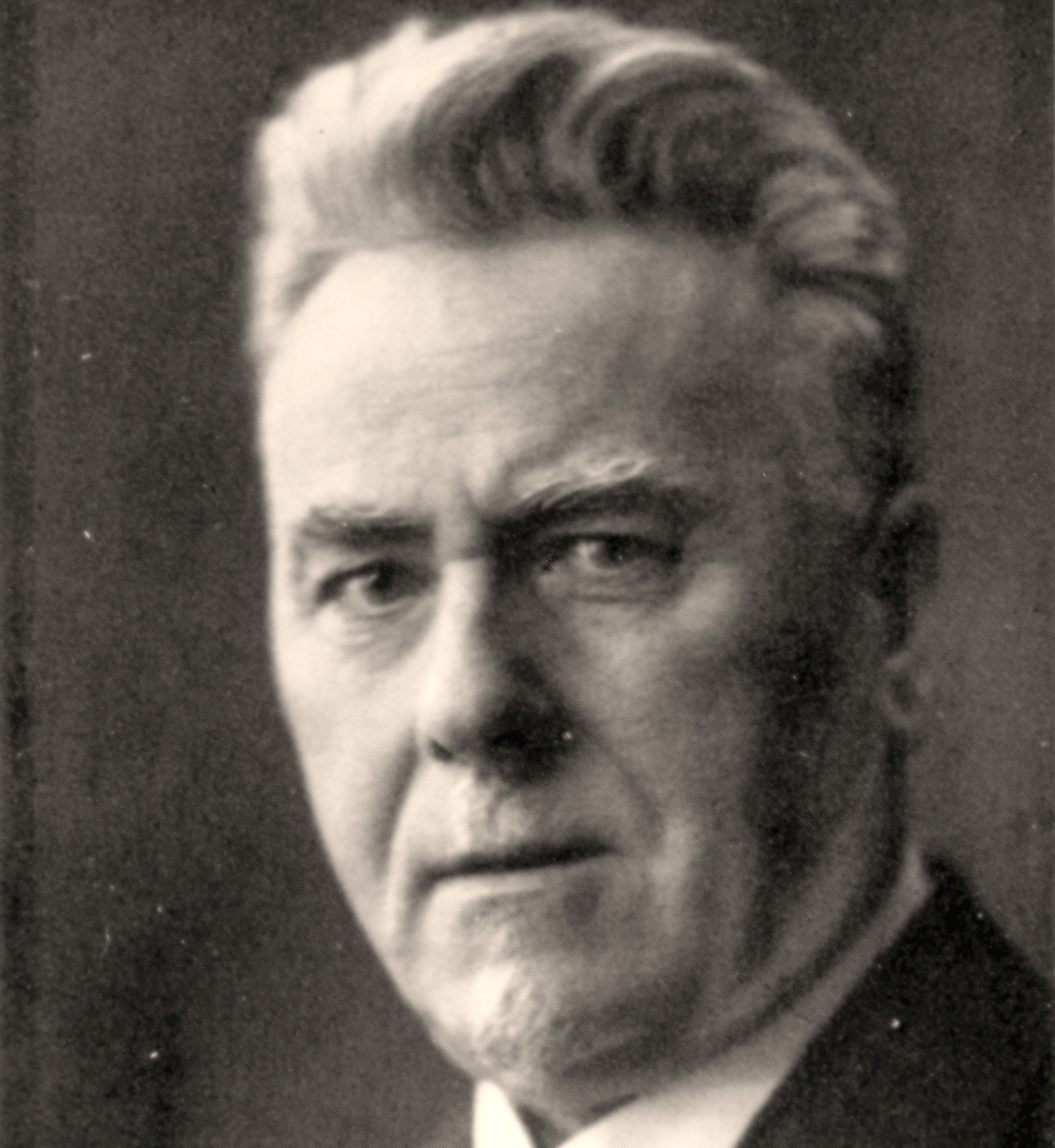- Surname:
- Rüdin
- First name:
- Ernst
- Era:
- 19th century
20th century - Field of expertise:
- Psychiatry
- Place of birth:
- St. Gallen (CHE)
- * 19.04.1874
- † 22.10.1952

Rüdin, Ernst
Swiss-born German psychiatrist, eugenicist and expert on racial hygiene in Nazi Germany.
Ernst Rüdin (1874-1952) was born in St. Gallen, Switzerland. His father was a textile merchant and his mother a medical doctor. Influenced by his then brother-in-law, Alfred Ploetz, who was considered the “father” of racial hygiene, the teenage Rüdin developed a strong interest in “racial hygiene as a German form of social Darwinism” (Weber 1996: 412; our translation).
Beginning in 1893, he studied medicine at universities in several European countries. After graduating in Zurich in 1898, he initially worked as an assistant to Eugen Bleuler at the psychiatric hospital of the University of Zurich (Burghölzli). In 1905, Rüdin was among the founders of the German Society for Racial Hygiene. He changed to the psychiatric clinic of the University of Munich in 1907 and became an assistant to Emil Kraepelin, under whom he completed his professorial thesis (habilitation). He was appointed senior physician in 1909 and associate professor of psychiatry in 1915. When the German Institute for Psychiatric Research (Deutsche Forschungsanstalt für Psychiatrie (DFA)) was established in Munich in 1917, Rüdin was put in charge of the Department of Genealogical and Demographic Studies. In his 1916 study Vererbung und Neuentstehung der Dementia praecox, he applied a new statistical method to prove the heritability of schizophrenia according to Mendel’s laws. From 1925 to 1928, he held the chair of psychiatry at Basel University but then returned to his previous post at the DFA with an expanded departmental budget and eventually assumed the directorship of the entire institute in 1931.
Career after 1933
Between 1932 and 1936, Rüdin was president of the International Federation of Eugenics Organizations. Although he did not become a member of the Nazi party until 1937, he actively collaborated with the Nazi regime right from the beginning: he became a member of the Expert Committee on Questions of Population and Racial Policy under the Interior Minister in 1933 and a judge at the Hereditary Health Court in 1934. Rüdin (1934; 1935) co-authored the commentary on the 1933 Law for the Prevention of Hereditarily Diseased Offspring and backed the collection of patient data throughout the Reich. He also stood in close contact with the co-ordinators of the patient killings that started in 1939 (e.g., Paul Nitsche), knew about the T4 euthanasia programme and obstructed colleagues who tried to voice protest (e.g., Hans Roemer). Moreover, he promoted research with the brains of killed children (Roelcke 2012: 307 ff.).
Ernst Rüdin is one of the researchers who bear the main responsibility for legitimising the Nazi sterilisation and euthanasia policies. At the end of the war in 1945, he was stripped of his offices and of the Swiss citizenship and was placed under house arrest. In his “denazification” trial in 1948/49, he used a typical strategy of self-exculpation by claiming that his work had been purely scientific and without any ideological purpose (Weber 1993). This claim was supported by former colleagues and other scientists, like Max Planck, and Rüdin was eventually classified as “exonerated”. He died in 1952, at age 78.
Awards
1939: Goethe medal for Art and science.
1944: Bronze eagle medal of the Reich.
Literature
Ley, A. (2004): Zwangssterilisation und Ärzteschaft. Hintergründe und Ziele ärztlichen Handelns 1934-1945. Frankfurt am Main: Campus.
Peters, U. H. (1996): Ernst Rüdin – ein Schweizer Psychiater als “Führer” der Nazipsychiatrie – die “Endlösung” als Ziel. In: Fortschritte der Neurologie und Psychiatrie 64, (9), pp. 327-343.
Roelcke, V. (2013): Die Etablierung der psychiatrischen Genetik. In: C. Wolters, C. Beyer, B. Lohff (eds.): Abweichung und Normalität. Psychiatrie in Deutschland vom Kaiserreich bis zur Deutschen Einheit. Bielefeld: transcript, pp. 111-135.
Roelcke, V. (2012): Ernst Rüdin – renommierter Wissenschaftler, radikaler Rassenhygieniker. In: Der Nervenarzt 83, (3), pp. 303-310.
Roelcke, V. (2002): Programm und Praxis der psychiatrischen Genetik an der “Deutschen Forschungsanstalt für Psychiatrie” unter Ernst Rüdin: Zum Verhältnis von Wissenschaft, Politik und Rasse-Begriff vor und nach 1933. In: Medizinhistorisches Journal 37, (1), pp. 21-55.
Rüdin, E. (1901): Über die klinischen Formen der Gefängnispsychosen. Inaugural-Dissertation zur Erlangung des Grades Doctor rerum medicarum des Fachbereichs Humanmedizin der Universität Zürich.
Rüdin, E. (1909): Über die klinischen Formen der Seelenstörungen bei zu lebenslänglicher Zuchthausstrafe Verurteilten. Habilitationsschrift zur Erlangung der Venia legendi des Fachbereichs Humanmedizin der Universität München.
Rüdin, E. (1916): Zur Vererbung und Neuentstehung der Dementia praecox. Berlin: Springer.
Rüdin, E. (1930): Psychiatrische Indikation zur Sterilisierung. In: Das kommende Geschlecht 5, (3), pp. 1-19.
Rüdin, E. (1930a): Die Bedeutung der Eugenik und Genetik für die Psychische Hygiene. In: Zeitschrift für psychische Hygiene 3, pp. 133-147.
Rüdin, E. (1934) (ed.): Erblehre und Rassenhygiene im völkischen Staat. Munich: J. F. Lehmanns Verlag.
Rüdin, E., A. Gütt, F. Ruttke (1934) (ed.): Zur Verhütung erbkranken Nachwuchses. Gesetz und Erläuterungen. Munich: J. F. Lehmanns Verlag.
Rüdin, E. (1935): Über das deutsche Gesetz zur Verhütung erbkranken Nachwuchses vom 14. Juli 1933. In: Schweizer Archiv für Neurologie und Psychiatrie 35, pp. 190-192.
Rüdin, E., O. Bumke, O. Foerster, H. Spatz (1939) (eds.): Studien über Vererbung und Entstehung geistiger Störungen. Berlin: Springer.
Schmuhl, H.-W. (2003): Rassenforschung an Kaiser-Wilhelm-Instituten vor und nach 1933. Göttingen: Wallstein.
Seidelman, W. E. (2000): Science and Inhumanity. The Kaiser-Wilhelm/Max-Planck-Society.
Weber, M. (1993): Ernst Rüdin. Eine kritische Biographie. Berlin, Heidelberg, New York: Springer.
Weber, M. (1996): Harnack-Prinzip oder Führerprinzip? Erbbiologie unter Ernst Rüdin an der Deutschen Forschungsanstalt für Psychiatrie in München. In: B. Vom Brocke, H. Laitko (eds.): Die Kaiser-Wilhelm-/Max-Planck-Gesellschaft und ihre Institute. Das Harnack-Prinzip. Berlin: De Gruyter, pp. 409-422.
Julian Schwarz, Burkhart Brückner
Photo: unknown / Source: Wikimedia / public domain.
Referencing format
Julian Schwarz, Burkhart Brückner (2016):
Rüdin, Ernst .
In: Biographisches Archiv der Psychiatrie.
URL:
biapsy.de/index.php/en/9-biographien-a-z/238-ruedin-ernst-e
(retrieved on:16.07.2025)
